Comedy is no doubt as old as humanity. Perhaps older! Perhaps Australopithecus snickered at the occasional rude gesture, comedic expression, or the sight of a saber-toothed tiger slipping on the ancient equivalent of a banana peel. Unsurprisingly, comedy has worked its way into science fiction and fantasy: Consider these five comedic works1, each of which will likely bring a smile to one’s face.
The Night Life of the Gods by Thorne Smith (1931)
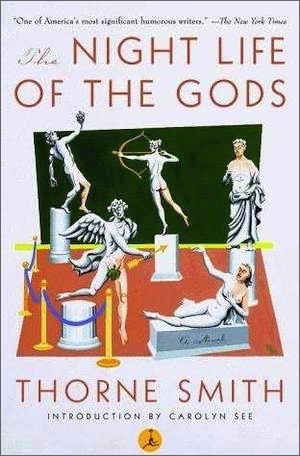
At first glance, Hunter Hawk seems to have been served the same dismal gruel as any other Thorne Smith protagonist. His home is inhabited by a swarm of grasping relatives, each one more feckless than the last.2 Other Smith protagonists require some external impetus to jar them out their conventional rut. Not Hunter Hawk, for long before the reader meets him, Hawk has energetically embraced mad science.
Having invented a petrification ray, Hawk’s immediate impulse is to turn it on his disappointing relatives. This leaves the inventor free for a meet-cute with Megaera, a 900-year-old fairy. It happens that Megaera has a trick that mirrors Hawk’s: she knows how to turn stone to living flesh. The couple could use this to de-petrify his relations. Instead, they transform statues of Roman gods into living deities.
The gods demand entertainment. Fortuitously, Jazz Age America is more than able to provide it.
Options by Robert Sheckley (1975)
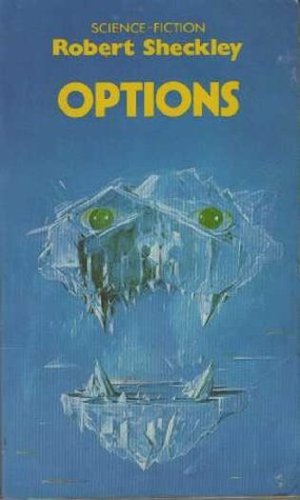
Forced by equipment failure to set his spaceship down on an alien world, Tom Mishkin is not worried. He is the scion of an experienced space-faring civilization, which has taken the precaution of scattering caches of emergency supplies on likely planets. This particular planet is not suited for human life, so Mishkin will have to rely on his Special Purpose Environmental Response robot. The robot will protect him on his way to the cache and help him repair his space ship. At least, that’s the plan…
Unfortunately the robot is programmed to deal with conditions on Darbis IV. Mishkin and his robot are on the planet Harmonium. The robot is worse than useless. Further setbacks ensue. Mishkin finds himself in dire straits. Will direct authorial intervention save the day?
This absurdist adventure could have been an utter downer of a book, but it isn’t (as one might expect from an author known for his sense of humor).
“The Ghost Who Vanished by Degrees” by Robertson Davies (1982)
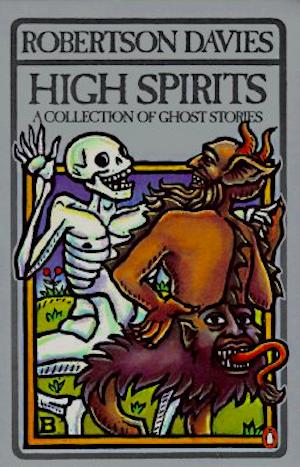
Robertson Davies is not entirely startled to be confronted by a ghost. That Massey College is haunted is no secret, and Davies is Master of Massey College. Indeed, Davies has seen the ghost in the past. However, being acknowledged and spoken to by the ghost is a new experience. As is being asked for help by the ghost.
Thirty years earlier, the ghost was a living graduate student. Having comprehensively failed his final examination, the despairing student killed himself. Ever since, he has haunted the college. His only hope of rest? Convincing Davies to revisit the shade’s examination so that the ghost can ascend to wherever ghosts go, newly conferred Ph.D. in hand.
There is the small catch, in that the ghost’s memories have faded somewhat since his death and he no longer remembers in which field his studies were focused. No worries! The ghost knows how to address that issue…
Archer’s Goon by Diana Wynne Jones (1984)
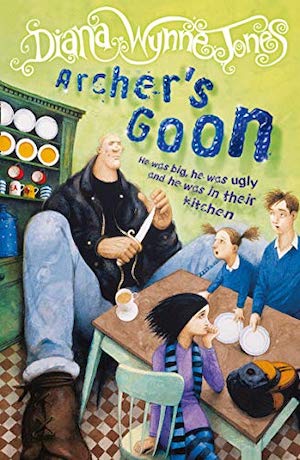
Young Howard Sykes returns home to discover that in Howard’s absence, a very large stranger has settled into the Sykes’ household. Howard’s father Quentin owes a mysterious Archer two thousand somethings. Archer has sent a goon to enforce payment. The goon won’t leave until Quentin hands over the somethings.
Wait. What? Somethings? Howard learns that his dad owes two thousand words, not two thousand pounds. This arrangement is a long-standing one, intended to jolt Quentin out of a nasty case of writer’s block. However, the arrangement was with one Mountjoy, not any one named Archer; no goons were involved. So what’s going on?
It turns out that the town in which the Sykes family resides is also the residence of seven powerful, irritable wizards. Wizards believe that Quentin is responsible for the fact that they cannot leave the town. They sent the goon; they won’t give up until Quentin and Howard lift the block; they might be angry enough to kill.
This one may not sound amusing either, based on the premise… but, believe me, it is!
Louisa the Poisoner by Tanith Lee (1995)
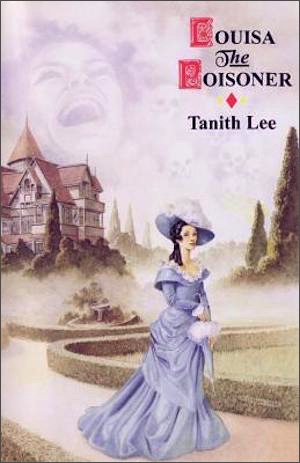
Pity poor Louisa, raised in a forbidding swamp by a mad aunt. When her deranged relative expires (of poison administered by Louisa), Louisa is left a penniless orphan. She has only one dubious asset: she has been schooled in the manners and customs of the well-born. Louisa’s charming ways win the young woman a place in the home of kindly Lord Maskullance.
This isn’t a romantic alliance. The lord feels a paternal fondness for the young Louisa. He takes this so far as to write a will that leaves her a share of his wealth. Not all of it; it is to be shared with a few other relatives. Louisa realizes that if those relatives were to die, her share would be larger.
Louisa is a determined young woman with healthy work ethic and an ample supply of poison….
***
No doubt you have your own comedic favourites, some of which might even be from the 21st century! Comments are, as ever, below.
In the words of Wikipedia editor TexasAndroid, prolific book reviewer and perennial Darwin Award nominee James Davis Nicoll is of “questionable notability.” His work has appeared in Publishers Weekly and Romantic Times as well as on his own websites, James Nicoll Reviews and the 2022 Aurora Award finalist Young People Read Old SFF (where he is assisted by editor Karen Lofstrom and web person Adrienne L. Travis). He is a four-time finalist for the Best Fan Writer Hugo Award, is eligible to be nominated again this year, and is surprisingly flammable.
[1]“A Civil Campaign” is screamingly funny and I wish I had not recently mentioned it (I don’t re-review books I’ve done recently). And the reason Pratchett is not here is because I don’t know how to pick just one: Have fun arguing in the comments which one should have been *the* one!
[2]Hawk spares his one non-feckless relative, favorite niece Daffy Lambert, a sparkling young woman who is an early example of a Manic Pixie Dream Girl (though not of romantic interest to Hawk, happily, given that they’re related). To quote an old review of mine, “Daffy would likely object to the implication in my wording that she would be someone’s girl, as opposed to the man being her fellow.”










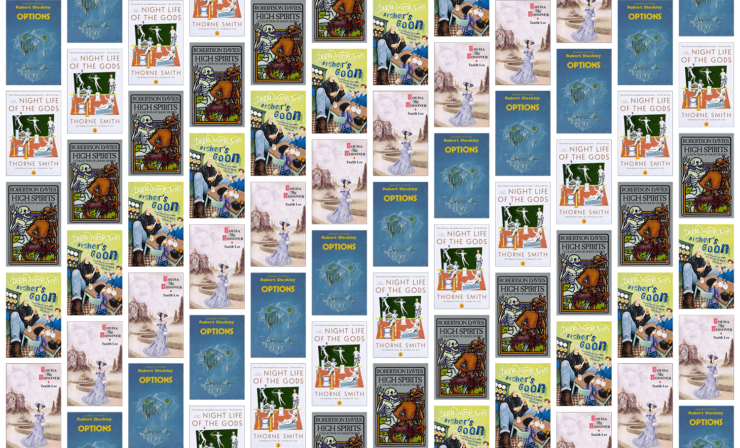
I finally got around to How Much for Just the Planet? and… eh. Maybe it would work on screen.
Hilariously funny (to me, anyways), Harry Harrison’s The Technicolor Time Machine involves a lame film production company using a dodgy time machine to make a Viking flick with real Vikings. A ripe set up, Harrison plays it very well; the love scene particularly appealed to adolescent me. I really can’t understand how this has escaped a film treatment of its own.
I enjoy Patricia C. Wrede Enchanted Forest Chronicles the first is Dealing with Dragons. Esther M. Friesner does several funny anthologies. Witch Way to the Mall, Chicks in Chainmail, Harpy High, Gnome man’s Land….
I also second Pratchett and a Civil Campaign or Lord Vorpatril’s Alliance too.
Wow, this is a big subject.
Walter Jon Williams’ Maijstral books are all screamingly funny, but if I had to choose one I’d go with Rock of Ages. What’s funnier than being challenged to a duel? Being challenged to multiple duels, obviously.
Almost everything Ron Goulart wrote is funny, but I’m fond of Hawkshaw, which introduces us to the werewolf of Westport and the Pope of New Jersey.
John Sladek’s Tik-Tok chronicles the adventures of a murderous robot, because what’s funnier than murderous robots? Besides, he has his reasons.
My favorite comedy SFF books are Tales from the White Hart by Arthur C. Clarke, Bill, The Galactic Hero by Harry Harrison and of course The Hitchhiker’s Guide to the Galaxy by Douglas Adams.
Tanya Huff’s Summon the Keeper had me laughing out loud. Claire, a member of the Keeper lineage, is sent to a bed and breakfast to deal with the evil lurking there, and ends up dealing with a lot of unexpectedly entertaining situations, like a group of geriatric Greek gods booking rooms and a sulky portal to hell. There’s also a magnificent talking cat – if cats could talk, I’d bet they were sarcastic, food obsessed little **** disturbers, to use the Canadian term. (Her urban fantasies are also unabashedly Canadian in setting and reference, which I thoroughly enjoy).
I did love Archer’s Goon. Connie Willis’ Bellwether is another funny one.
@5 beat me to Bill, the Galactic Hero and @6 beat me to the Summoner series. I don’t know the Sheckley book mentioned, but The Game of X has been on my shelves for at least 50 years and is also very funny, although it’s not really SF. I agree that Pratchett offers an embarrassment of riches in this category, but I’d probably go for Hogfather, if only because we get to see Death as a Discworld department-store Santa (and also I love Susan).
Janet Kagan’s works are almost all funny…
I second the vote for Tanya Huff but my favorites are the Smoke books… Tony is a lovely disaster.
Doris Egan’s Two bit heroes is totally hilarious (and dire). Much recommended.
Connie Willis has lots of very amusing work but my all time favorite is the story ‘spice pogrom’. It is madcap farce even beyond that of bellweather.
Not sure The Last Unicorn quite fits the description of “much funnier that it sounds.” However, because the bittersweet ending is what I remember the best, I forget how much understated humor it contains each time I reread it.
Always glad to see a mention of Thorne Smith books!
Another series that I always find incredibly amusing is the Chronicles of Master Li and Number Ten Ox, by Barry Hughart. The first book in the trilogy, The Bridge of Birds, is narrated by Number Ten Ox, and relates how he recruits Master Li (an ancient sage with a slight flaw in his character) to save the children of a certain age in his village who have all been stricken with a plague. Once you start reading it, it’s very hard to put down…
I have fond memories of all of Thorne Smith’s works. I am able to retain those fond memories because I have given away all my copies of his books and have firmly forbidden myself to re-read any of them. They certainly were funny in their time, which was a generation and a half before my time.
Ursula Vernon’s many works under her T Kingfisher alias are genuinely some of the funniest things I’ve read in years, absolutely filled with snarky protagonists and absurd situations. Swordheart is probably the most straightforward example with the least unexpected severed heads.
I’m unfamiliar with all of these books but look forward to exploring them. Thanks for the list James. – Carl Kruse
Louisa the poisoner sounds like she should take notes from Louis D’Ascoyne Mazzini in Kind Hearts and Coronets. He uses a variety of MO’s to take care of the people that stand between him and the Dukedom. Notable for how he and all his relatives bare a striking resemblance to Sir Alec Guinness… ;)
@2/MattS – agreed. I thought the way Harrison closed the time loop with the hand injury was hilarious, and that poor archaeologist who located “proof” the Vikings had sophisticated glass manufacture, only to be completely discredited due to the glass in question being from a popular bottled beer brand…
@8 – avoid Condorman, the film based on The Game of X, there’s very little resemblance in plot or characterisation and it’s Disney low-budget live action hackwork, which should be enough warning.
@12 – a long time ago I wanted to write a role playing game based on Thorne Smith’s works and put in a lot of work scanning them before discovering that they were still in copyright in the USA, and that the copyright-holder was not interested in licensing them. As a result I have most of his fantasy and his one detective novel readable on my web site – don’t look if you’re in the USA (unless the copyright has finally lapsed there, I really can’t be bothered to check).
http://www.forgottenfutures.co.uk/smith/smith.htm
+1 for Technicolor Time Machine and Rock of Ages. Harrison’s A Transatlantic Tunnel, Hurrah AKA Tunnel Through The Deeps is also fun, it’s an Edisonade set in an AU where the American Revolution flopped, and has a LOT of in-jokes for SF fans etc. I’d also like to recommend John Brunner’s Timescoop, if you can find it, a fun “bring people from the past to the present” novel.
@16 – sorry, ignore the last few characters of the URL in my previous post, a space somehow got included and converted into a non-breaking space. It should be
http://www.forgottenfutures.co.uk/smith/smith.htm
One more recommendation – John D. MacDonald’s The Girl, The Gold Watch and Everything, a lovely romp which unfortunately has some period sexism but is great fun otherwise.
One (at least this one) does not usually associate the words “funny” and “Bradbury”, but his late novel From the Dust Returned is deeply chortlesome in a Chas Addams sort of way.
James Branch Cabel wrote numerous books, ranging from quite serious to very funny. His Jurgen may be my favorite “deal with the Devil” book ever. It’s quite raunchy for 1919. It was in fact the subject of an obscenity trial that paved the way for books like Ulysses (hey, James, have you done one on “legally challenged books” yet?) It’s the story about how a middle-aged man, given back his youth for a year, wastes it quite as thoroughly as he wasted his original youth. And yet it is (in a 1919 sort of way) hilarious.
Which reminds me, another topic suggestion: Five Heinlein juveniles not written by Heinlein.
@0: ISTR that Options got poor reviews when it came out; that’s probably why I didn’t read it after liking much other Sheckley. Some of his novels show the seams of fixups, but Mindswap still seems funny. Now I’ll have to see whether Options still holds up.
@1: tastes vary; I loved Planet (maybe even moreso after Hambly grumbled about no longer having the only OST book in which nobody dies, or after hearing Ford talk about the scene Paramount made him cut), but I may be biased from having grown up with the somewhat plastic characters.
I remember liking The Evolution Man by Roy Lewis, though it is decades since I read it.
Okay, bunch of comments here.
@2, 4 and others: With regard to Harrison, I somehow enjoyed more his Star-Smashers of the Galaxy Rangers, a pretty deadly send-off of a lot of old-school space opera. I still remember from the afterword his referring to it as “the present exercise in crotch-kneeing,” as he was being pretty ruthless with a number of old tropes.
My own suggestion would be Elizabeth Boyer’s The Elves and the Otterskin, in which a group of elves are set an impossible task straight from Icelandic legend, and have to take on a seriously dangerous necromancer. It sounds as though it should be grim, but the humor is pretty good.
On the other hand, nobody mentioned James Blaylock’s The Elven Ship and its related works (one sequel, one prequel, I think). There are some grim bits, as when the goblins start to destroy things, and the character of The Squire is … amazing. You see the goblins,you see the witch, you see the dwarf necromancer, and you wouldn’t think you’d laugh as much as you do. Or at least as much as I did.
@8, Pratchett is indeed nearly across the board full of laughs. I’d probably agree about Hogfather, but also have a warm spot for Small Gods.
@13: Ursula Vernon’s Castle Hangnail is one of my favorites; at least two lines caused me and my wife to laugh out loud even on the second reading, which is unusual for us.
I’ll throw in a good word for the droll domestic humor of John Morressey’s Kedrigern books. A Voice for Princess was funniest, I think. The stories are somewhat dated and sexist, though, so perhaps not to everyone’s taste.
Clifford Simak’s The Goblin Reservation is on my occasional re-read list as well, though the humor may not work as well for those who are not part of academia. The same may be said for Zelazney’s Doorways in the Sand, which had more than a few laughs sprinkled in among the interstellar-community-shaking concerns.
I’m sure there are more, but they are not coming to mind at the moment. This was a good article, and I’ll have to look up some of those works!
It’s not a comedy per se, but large parts of Neal Stephenson’s Cryptonomicon are funny as all hell.
And Terry Pratchett’s funniest book is Jingo.
I confess that I very, very rarely find anything in a novel or story so funny as to make me actually laugh. In fact, I have a hard time thinking of any fiction I’ve ever read that elicited more than a smile from me. This is as opposed to nonfiction; plenty of essays and other articles have made me laugh, so it’s not as though it couldn’t happen. I just don’t think that most (any?) fiction writers are that funny in print. I may have to try some of the works listed above to see if they do the trick.
Anyway, one work that I know was meant to be pretty funny was Niven and Gerrold’s The Flying Sorcerers. I guess it was.
Also, L Sprague de Camp’s Lest Darkness Fall had some humorous bits in it.
Connie Willis’s To Say Nothing of the Dog is hilarious, even after multiple re-readings. Also, Kim Stanley Robinson’s collection Escape From Kathmandu, especially the title story.
For another Stephenson with a burst of humor in an otherwise serious novel, there’s the section in The Diamond Age discussing Dr. X’s troubleshooting techniques.
Other than those already mentioned such as Bellwether and Pratchett (I’m particularly fond of Nightwatch and Going Postal), Steven Brust’s The Phoenix Guards suited my sense of humour perfectly.
Memoirs Of An Invisible Man by H. F Saint was worth reading twice
Surprised no-one has mentioned Eric Frank Russell yet.